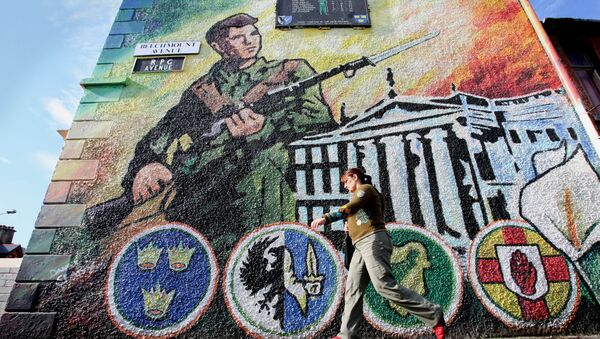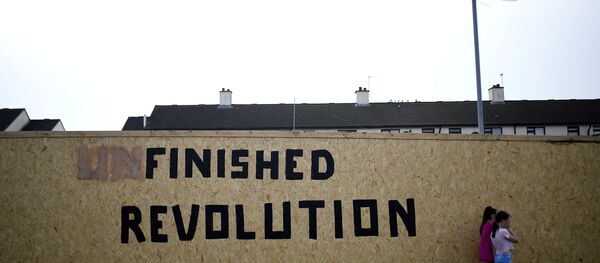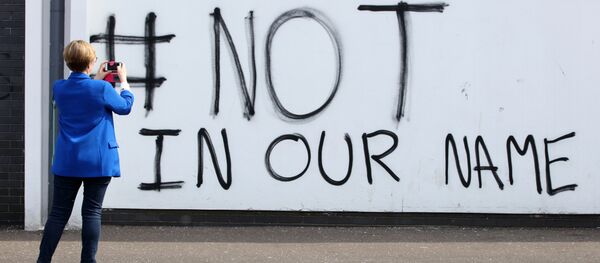Sputnik: The New IRA have claimed that Brexit is helping them recruit new militants. How trustworthy is such a claim?
Kevin McNicholl: This is probably accurate, but it is important to consider that the majority of commentary linking Brexit to violence comes from outside Northern Ireland. Brexit was barely mentioned as an important factor in the killing of Lyra McKee among people inside the region. Issues such as the lack of an executive, the blocking of democratic ways forward on abortion reform, marriage equality, a border poll, and a government that is shown to be deeply corrupt, along with remaining issues of poverty and segregation, and the relationship between the security forces and the citizenry, particularly with regard to blocking justice on historical issues, have all led to a deep dissatisfaction and frustration among nationalists. The IRA then would be likely to continue Brexit or No Brexit.
Moreover, using our peace as part of the brexit debate isn't just cynical but it is dangerous. One mercy in the 'troubles' was that we were not at the centre of a geopolitical game in the same way as Syria or Yemen are today. Now however we are front and centre of a conflict between neo-liberal centrists and right wing nationalists that cuts right across England, Europe and even the USA and South America. We didn't ask to be a part of this conflict and it would better if our peace was not part of the debate.
Sputnik: What's the level of IRA support in the society now, can it really increase if Brexit happens?
Kevin McNicholl: The IRA have very little explicit support. The most recent murder has been met with an enormous outpouring of disgust. This must however be taken in context. Even the Provisional IRA never enjoyed widespread nationalist support, except for at a few key moments. Had the IRA hit a police officer, the revulsion would have been more subdued. If the police had fired back and hit the gunman there would have been quiet anger among a lot of nationalists. Had they fired back and hit a rioter, there would have been an outpouring of outrage against the police and it would have suited the IRA very well as a propaganda victory. This is how volatile public opinion can be. An opinion survey conducted by our team of researchers at Queen's University showed that if a hard border were to be reintroduced about 20% of Sinn Féin supporters would support attacks on border infrastructure provided no one was hurt. This is quite a high number, but the true figure is likely higher given a reluctance to answer this question truthfully.
Sputnik: We now hear about Continuity IRA, Provisional IRA, Real IRA, New IRA. What's the difference and what was the evolution of the group?
Kevin McNicholl: In 1969, state violence against civil rights demonstrators and the Catholic population was creating the biggest forced migration of people anywhere in Europe since the Second World War. The Official IRA decided that what they saw as a progressive and socialist struggle against British rule was being overtaken by a reactionary sectarian clash between Catholics and Protestants. They did not see this as a useful context for their struggle, and so they called a unilateral ceasefire. The Provisional IRA then split from the Officials and were the major conflict protagonist in the 'troubles'.
In 1986 the Adam/McGuinness leadership began taking a more party political direction for the movement, and so they lobbied to let Sinn Féin ditch its abstentionist position and take seats in Leinster House (Irish parliament). As the IRA were part of the losing side of the Irish Civil War, a recognition of the legitimacy of the Dublin government was extremely controversial, and a minority split to form Republican Sinn Féin, and it's associated paramilitary wing, the Continuity IRA. In a similar fashion, the Real IRA emerged following a split after their 1994 ceasefire.
The political differences between these groups can be opaque and confusing. However, intra-nationalist factional antagonisms have historically been ferocious and many lives were lost in conflicts between groups.
Sputnik: How dangerous are IRA's threats for ordinary Brits?
Kevin McNicholl: It seems likely the IRA will be very keen to attack Great Britain where bombs are much more likely to receive mainstream attention. Some letter bombs earlier this year sent to destinations around GB are indicative of this. On the other hand, they may see fit to keep a lower profile for the time being following the public outrage at their last killing. Either way, they will be keen to avoid civilian causalities while maximising the economic impact of any future attacks.
Sputnik: What about the hard border? Do you think it will ever appear?
Kevin McNicholl: It depends on what Westminster eventually decides and how this decision is received by the EU. It's certainly hard to imagine, and even if it were attempted it would probably be very porous. Any strengthening of the border regime would be met with civil disobedience and probably attacks on any border posts. The political backlash against a Dublin government accepting a hard border is likely to be severe. At the same time it is important to highlight that there already is a hard border for some people. Ethnic minorities are routinely profiled by Gardaí for immigration checks on buses travelling between north and south.
The views and opinions expressed in this article are solely those of the speaker and do not necessarily reflect Sputnik's position.





